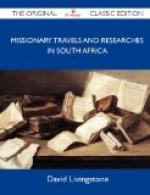Chapter 19.
Guides prepaid—Bark Canoes—Deserted by Guides—Mistakes respecting the Coanza—Feelings of freed Slaves—Gardens and Villages—Native Traders—A Grave—Valley of the Quango—Bamboo—White Larvae used as Food—Bashinje Insolence—A posing Question—The Chief Sansawe—His Hostility—Pass him safely—The River Quango—Chief’s mode of dressing his Hair—Opposition—Opportune Aid by Cypriano—His generous Hospitality—Ability of Half-castes to read and write—Books and Images—Marauding Party burned in the Grass—Arrive at Cassange—A good Supper—Kindness of Captain Neves—Portuguese Curiosity and Questions— Anniversary of the Resurrection—No Prejudice against Color—Country around Cassange—Sell Sekeletu’s Ivory—Makololo’s Surprise at the high Price obtained—Proposal to return Home, and Reasons— Soldier-guide—Hill Kasala—Tala Mungongo, Village of—Civility of Basongo—True Negroes—A Field of Wheat— Carriers—Sleeping-places—Fever—Enter District of Ambaca—Good Fruits of Jesuit Teaching—The ‘Tampan’; its Bite—Universal Hospitality of the Portuguese—A Tale of the Mambari—Exhilarating Effects of Highland Scenery—District of Golungo Alto—Want of good Roads—Fertility—Forests of gigantic Timber—Native Carpenters—Coffee Estate—Sterility of Country near the Coast—Mosquitoes—Fears of the Makololo—Welcome by Mr. Gabriel to Loanda.
24Th. Ionga Panza’s sons agreed to act as guides into the territory of the Portuguese if I would give them the shell given by Shinte. I was strongly averse to this, and especially to give it beforehand, but yielded to the entreaty of my people to appear as if showing confidence in these hopeful youths. They urged that they wished to leave the shell with their wives, as a sort of payment to them for enduring their husbands’ absence so long. Having delivered the precious shell, we went west-by-north to the River Chikapa, which here (lat. 10d 22’ S.) is forty or fifty yards wide, and at present was deep; it was seen flowing over a rocky, broken cataract with great noise about half a mile above our ford. We were ferried over in a canoe, made out of a single piece of bark sewed together at the ends, and having sticks placed in it at different parts to act as ribs. The word Chikapa means bark or skin; and as this is the only river in which we saw this kind of canoe used, and we heard that this stream is so low during most of the year as to be easily fordable, it probably derives its name from the use made of the bark canoes when it is in flood. We now felt the loss of our pontoon, for the people to whom the canoe belonged made us pay once when we began to cross, then a second time when half of us were over, and a third time when all were over but my principal man Pitsane and myself. Loyanke took off his cloth and paid my passage with it. The Makololo always ferried their visitors over rivers without pay, and now began to remark that they must in future fleece the Mambari as these Chiboque had done to us; they had all been loud in condemnation of the meanness, and when I asked if they could descend to be equally mean, I was answered that they would only do it in revenge. They like to have a plausible excuse for meanness.




